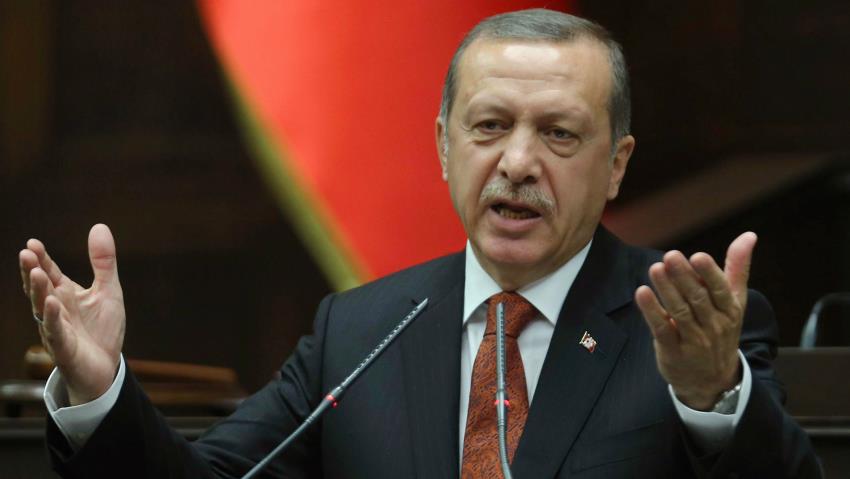Women have rights and we’re not going to lose them now.
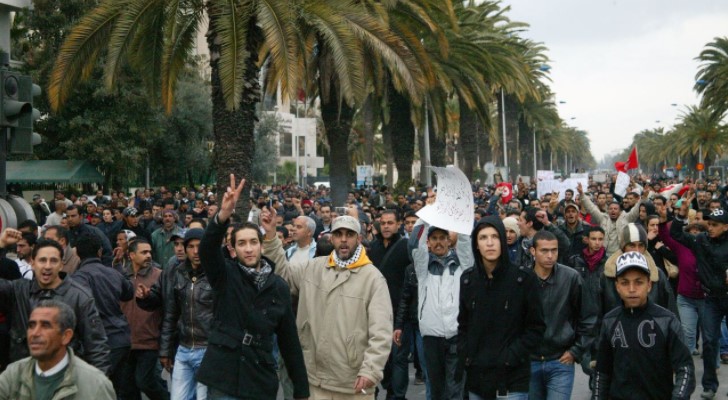
In the days immediately following the toppling of President Zine El Abedine Ben Ali on 14 January, Tunis was a city exhilarated by the success of the revolution. Energized protestors kept up pressure on the newly formed interim government. A sit-in outside government offices in the Kasbah led to the ousting of the few remaining politicians associated with the old regime. Trade unions, now emboldened, organized strikes to demand better salaries and working conditions. On Habib Bourguiba Avenue, the Tunisian equivalent of the Champs-Elysées, strangers spontaneously gathered to discuss politics, economics and social issues. Under the tree-lined central promenade, near the sweet-smelling popcorn stalls or sitting at the Paris-style cafés, people from all walks of life were conversing. As I wandered around talking to them, it was clear that all were proud of their achievement and felt they had won back their dignity. They were thrilled to speak freely, and it was truly exciting to see everyone exercise freedom of speech as if it were a newly discovered skill that needed testing and practice. It was, put simply, democracy in action.
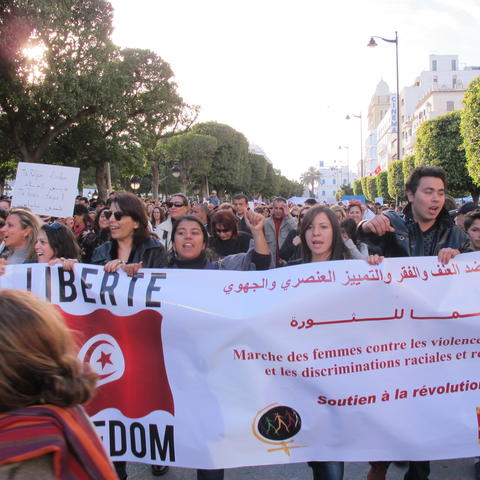
In this heady aftermath of the revolution, feminists – just like liberals, leftists, trade unionists, Islamists and other previously suppressed groups – were busy regrouping and organizing themselves to make sure they would play a role in the new democracy.
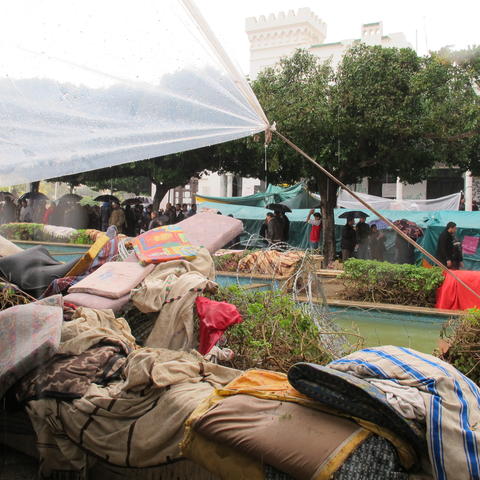
Women are very visible in Tunisian society. They mix freely with men, are highly educated and career-minded, and have enjoyed some of the most egalitarian legal rights in the Arab world, enshrined in the Personal Status Code (PSC) of 1957. The PSC was drawn up by Habib Bourguiba, Tunisia’s first president, directly after independence from France and even before the national constitution was written. It improved women’s rights, particularly in family law, by removing some of the more patriarchal aspects of shari’a: polygamy was abolished, the consent of both parties was now required for marriage and judicial procedures for divorce were established. Bourguiba was ousted in 1987 by Ben Ali, who extended the pro-women policies. One of the most interesting aspects of the Tunisian Revolution from a feminist perspective is that many of the women who participated in the protests that brought down Ben Ali are now campaigning to defend the rights they’ve already been enjoying for some time, fearing that the post-revolutionary period might bring a surge in popularity for the Islamist party, Al Nahda (‘the Renaissance’), and a swing towards traditionalist ideas about women.
On 29 January, two independent women’s associations, together with the women’s commission of the national trade unions and the Tunisian League for Human Rights, planned a major demonstration. I went along to talk to some of them.The demonstration began smoothly, as the women and their male supporters proceeded slowly down Habib Bourguiba Avenue, holding placards and chanting phrases in support both of the revolution and of the safeguarding of women’s rights. But this didn’t last. Quite suddenly, a rowdy group of young men appeared out of nowhere, headed directly at the procession of feminists. It looked like a counter-demonstration. Shouting and creating noisy confusion, the youths marched at the demonstrators head-on, in effect dispersing them. Jostled and almost toppling over, I lost track of the feminist group as they dissolved into the crowd. It was unclear who the invaders were and what they wanted, since they weren’t shouting coherent slogans.
But women had more than this to contend with – as I was about to find out. Behind me, angry voices were raised: a man was arguing with one of the women who had been demonstrating. He was criticizing feminists and associating them with Ben Ali’s hated wife Leila. She had been head of the Arab Women’s Organization, but like her husband, she was extremely corrupt, amassing a huge fortune and enjoying a lavish lifestyle while Tunisians suffered unemployment, low salaries and brutal political repression.
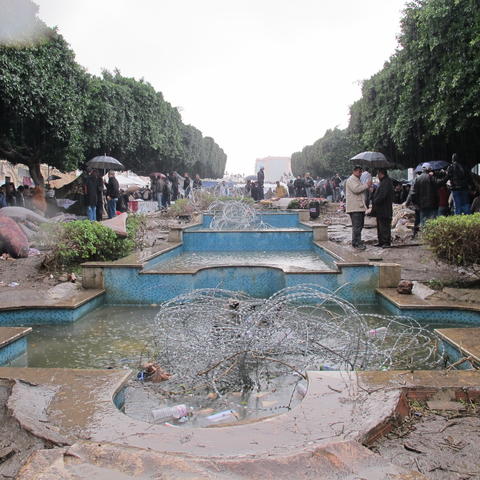
Feminism in Tunisia only began to gain widespread grassroots support in the late 1980s, partly as a result of improved education for women. Tunisia’s famously egalitarian gender policy in fact has had more to do with each government’s power struggles than with any real commitment to feminism. Following independence from France in the mid-1950s, Bourguiba prioritized women’s rights as a pragmatic policy designed to undermine his religious and traditionalist rivals. However, when he faced a threat from the left during the seventies and eighties, Bourguiba did not hesitate to make a strategic rapprochement with Islamists. When Ben Ali came to power, he aligned himself with the new, growing feminism and women’s rights advocates – and against an increasingly popular Islamic fundamentalism.
The man criticizing feminists on Habib Bourguiba Avenue was not spared. Two young women were incensed by his complaints and began to lecture him and anyone who would listen. ‘I’m sick of hearing that – you don’t know what you’re talking about!’ one said. The other argued, ‘We’ve got nothing to do with Leila and we’re as against the old regime as you. But women have rights and we’re not going to lose them now.’
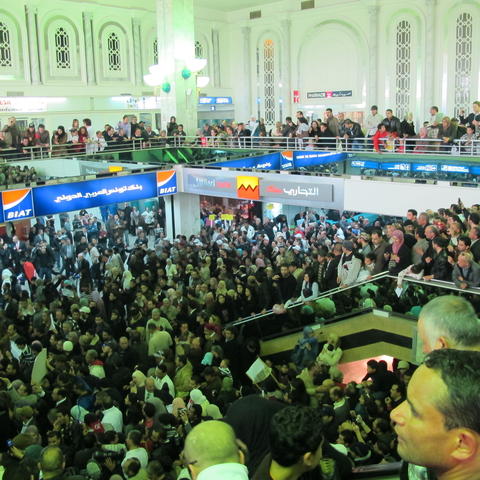
At Tunis Airport the very next day, several thousand supporters turned up to welcome Rached Ghannouchi, the leader of the Islamist party Al Nahda as he returned from twenty-two years in exile. Members of the party had been persecuted during Ben Ali’s regime, particularly after winning fifteen per cent of votes in the 1989 elections. Only now, in the period following the revolution, could they return to Tunisia.
A small group of anti-Islamist protestors had also gathered at the airport. Both sides were were calm and serious. There wasn’t much loud cheering – just a show of support in numbers. Manachou Marwan, an attractive and assertive young chemistry student, approached me, eager to have her say. She made a persuasive case for the inclusion of Al Nahda in the new democracy. ‘Culturally and religiously, this is an Arab country and people have Islam in their hearts,’ she said. ‘It’s true that the vast majority aren’t practising Muslims, but it’s still an important part of the culture.’ Manachou liked Ghannouchi’s notion of liberty: ‘I choose not to wear the hijab’, she explained, ‘but I believe in my aunt’s or my friend’s right to wear it if they want to.’ Under Ben Ali, women who wore headscarves were actively discriminated against or even banned from schools and certain jobs.
Tunisians on the whole are intolerant of religious extremism, and Al Nahda is a moderate and scholarly Islamist party. In an interview with Reuters soon after his arrival, Ghannouchi stated that he would not run for office, but that Al Nahda would participate in Tunisia’s first free elections and help work towards the democratization of the country. He might have been expressing a moderate message in order to survive in the new era, but it was clear to all those who supported democracy in Tunisia that Al Nahda had to be included in any kind of new democratic system, so that it could be held up to scrutiny and healthily opposed within it.

Feminists are working tirelessly to ensure that women will be represented in the forthcoming elections. Two of the key independent feminist organizations operating in Tunisia over the last twenty years, the Association des Femmes Tunisiennes pour la Recherche sur le Développement and the Association Tunisienne des Femmes Démocratiques, are working to this end. But they face many difficulties today because they are unknown to a new generation of women, thanks to the fact that they were suppressed by the Ben Ali regime, which outlawed or harassed all organizations not linked to his party.
Radhia Belhaj Zekri, the president of the Association des Femmes Tunisiennes, is now in her sixties but has the energy of a twenty-year-old. She explained to me how, after 1989, she and her fellow activists suffered the same monitoring and repression as other independent organizations, and had to function discreetly, running their women’s rights awareness and education programmes almost in secret. ‘The number of times we organized events and international conferences, only to be told at the last minute that they were cancelled . . .’ she reminisced. Government officials would simply pay a visit to the conference venues or hotels and tell them not to host the feminists. It’s not surprising that people, like the angry man on Habib Bourguiba Avenue, still confuse the independent women’s organizations with the state-sponsored feminism of the Ben Alis who were effective in hijacking the movement for their own ends.
Nadia Hakimi, the executive director of the Association des Femmes Démocratiques, told me that a general swing back to conservatism is likely, and she believes that Islamists deserve to express themselves after their terrible persecution. But her greatest concerns were more immediate: the many cases of sexism in the workplace and at home, and continued violence against women. A group of volunteers had just returned from Kasserine and other rural regions, where they had been documenting injuries inflicted on men, women and children during the revolution. These areas suffered the most violent crackdowns by security forces.
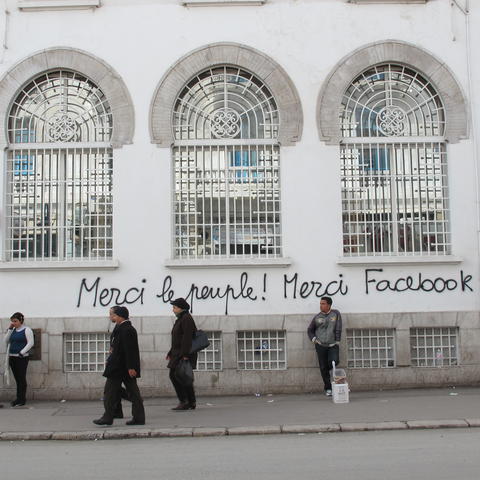
It was the ‘crazy contradictions of this country’ that caused Nadia to shake her head in frustration. ‘Whole families were terrorized under Ben Ali,’ she said. ‘Yet it was his party, and not the leftists, who defended women’s rights.’ The Arab Spring has opened up the region to the unknown, and no one can predict exactly how events will unfold or how popular the Islamist parties ultimately will be. In Tunisia, women have campaigned alongside men for political emancipation, yet they are paradoxically also in a defensive position. Many feel the need to defend the rights they enjoyed before the revolution while simultaneously building on them and pushing for greater overall political participation. It is a challenging position to be in, but the proliferation of newly created political parties since the revolution reveals that at least the options are no longer hopelessly polarized between dictatorship and Islamism.
Read the full article in Granta here

